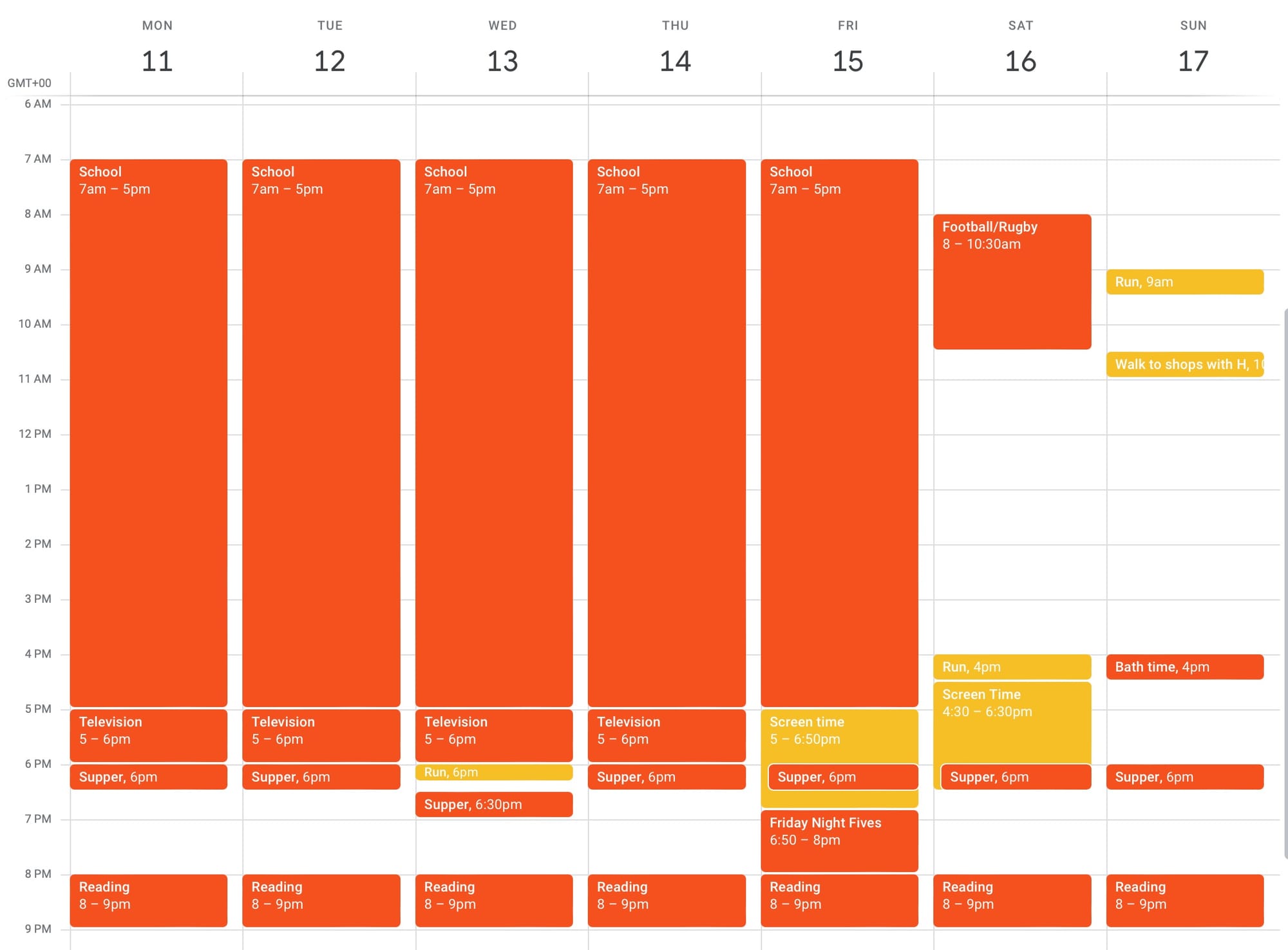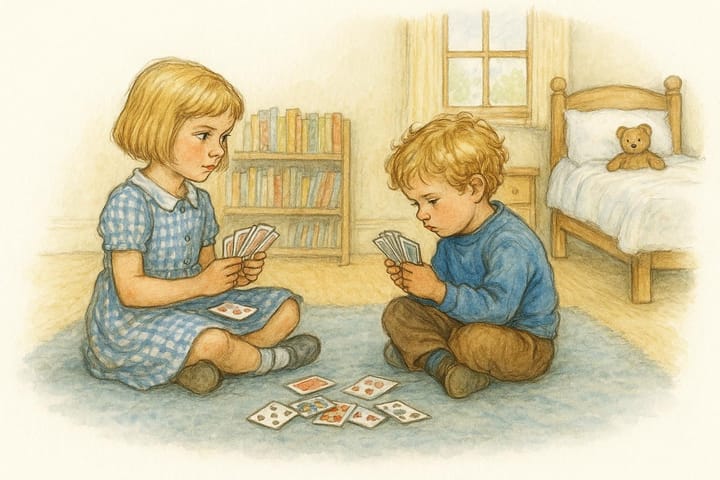An independence bucket list
How much independence would your child like? Have you asked? The answer might surprise you.

My sons got angry last night.
I was the worst dad ever - and that’s a euphemism. They wished me all kinds of Old Testament punishments, and more.
My crime?
I broke a ‘promise’.
Screen-free weekdays
In the Play with Purpose house, we don’t allow screens during the week. Friday night is their chance to go online and play games with their friends. After an initial struggle, they have come to accept this and weekday evenings are now calm, filled for the most part with reading, homework, piano practice and some crafting for the six-year-old.
NOTE: The six- and nine-year-olds are not playing online games! They get less time, and it’s limited to drawing on the iPad or playing simple games like Tetris. The six-year-old, especially, tires even of this and it’s not long before she’s back at the kitchen table crafting or mixing things, anything from slime (an obsession of hers) to cake dough. Even the nine-year-old has understood that screens get boring and often skips her screen time to play the piano or rollerblade down our shoe-strewn hall. In our house, problem screen-time is with the boys. It sucks them in and it stresses them. With so many of their friends online (and now at other schools where they’re no longer in daily contact), it seems cruel to cut off this communication completely, but having allowed too much in the past, we have now cut back to levels that preserve harmony in the house and leave plenty of time for the better things in life.
Ideally, I’d not give the six-year-old any screen time at all. She doesn’t care for it and wouldn’t miss it if it were gone. If she had no older siblings, there is no way that I would ever allow her near a screen. But she has FOMO, as we all do. And who wants to be deprived of something your brothers and sister are clearly enjoying? So she gets a token amount. Enough to feel like she is one of the gang.
But yesterday we were home late after school. A drop-off at a sleepover for one of the girls, a cross-country race for my second son, collecting the youngest from a party and then my wife from the station.
There was a hard stop at 7.40 for their evening 5-a-side match. The promised - and long-anticipated - two hours of screen time had become 40 minutes.
Cue meltdown.
It was my fault.
I wasn’t to blame for the London traffic, the accidents, the roadworks, the train strike, the closed bridges.
But I was responsible for not making time visible.
They felt ambushed.
That morning, looking ahead at my day, I could see that I was going to spend several hours in the car, driving from one place to the next. The children understood this too, but they hadn’t grasped what impact it would have on their screen time. If I’d explained this in the morning and asked them to come up with their own solutions, they would have felt much happier and in control. They might have said, OK, only 40 minutes tonight is annoying but we can have the rest on Saturday afternoon. But we want some extra time to make up for it!
And I would have said, ‘yes’.
Left brain, right brain
But I didn’t do that. I assumed they realised that they would have less screen time. When it finally dawned on them, they were furious.
The old me, the my-way-or-the-highway me, would have pulled rank.
We’re a family. We all have to make sacrifices sometimes. Next week it might be your party and the girls will be stuck in the car instead of playing at home. That’s just how it goes.
As adults, it’s clear to us. It makes sense to our ‘left brain’, the logical, language-based and literal part of our minds.
Unfortunately, children are more ‘right-brain’, as Daniel Siegel explains in The Whole-Brain Child.
The right brain… is holistic and nonverbal, sending and receiving signals that allow us to communicate, such as facial expressions, eye contact, tone of voice, posture, and gestures. Instead of details and order, our right brain cares about the big picture - the meaning and feel of an experience - and specialises in images, emotions, and personal memories.
Siegel, Daniel J. ; Bryson, Tina Payne. The Whole-Brain Child: 12 Proven Strategies to Nurture Your Child's Developing Mind
What does this mean for my Friday-night screen-time battles?
My left brain, the logical, rational part, wanted to argue, to reason with them, but children who are emotionally flooded can’t engage. I had to help them self-regulate.
This is why I created The Play Tools. There are going to be plenty of times when you say ‘no screens’ and your child gets cross. You may have all kinds of fun and interesting alternatives on stand-by but an angry child is in no state to participate.
You have to find ways to calm her down first.
A healing afternoon
My sons have now accepted that they become dysregulated after screen time. Bedtime is fraught.
I used to say, “Look what screens have done! Can you see how stressed you are? On weekdays, you’re always calm. You’re the sweetest, kindest children I know. It’s only after screens that you do this.”
That might be true but it only just inflamed the situation.
Instead, I now leave them to calm down in their rooms, ignoring the insults (which I used to find very hard to do - I thought they shouldn’t be allowed to ‘get away with it’). I turn a blind eye to the rudeness and let them self-regulate. Once they are calm, I go in, give them a hug and say nothing about their misbehaviour. I just hold them for a while and then, almost magically, the anger leaves them and they soften.
NOTE: See the Play Tool on breathing together for a quick way to calm an upset child.
Only then can I use words. Their emotional right brain is no longer in control. I can talk to their logical left brain, the part that understands why we had less screen time today, the part that knows screens are harmful, even if they’re also brilliant fun.
Getting your child to understand the harm that screens cause is a good first step. But it’s not enough.
You have to paint a picture of a happier future, a day full of so much fun that screens are forgotten.
Calendar time
Last week, we talked about journaling. It’s not going to work with every child.
My sons fall into this camp.
But that doesn’t mean we can’t get the benefits another way.
My eldest was still cross in the morning about his truncated screen time so I sat him down and we created his very own Google Calendar.
This works better with a ten-year-old than a five-year-old because of children’s developing understanding of time but it’s a worthwhile exercise nevertheless.
We created two calendars: a red one for ‘commitments’, and an orange one for ‘fun’.
You’ll notice that there’s a daily television slot at 5 pm when we get back from school. The school run can take me up to three hours as the children are at three different schools, with staggered finishing times.
The television time is there if they need it. It’s a chance to decompress. They don’t always take me up on the offer. The only rule is it has to be something that appeals to all four of them.

The ‘80s; the glory days
In a recent email, I mentioned that we would revisit a conversation I’d had with my second son.
Today was so boring, Dad. All we did was stay at home.
I had been putting the finishing touches to my new project, Play with Purpose. My wife was at work and the children were the innocent victims, left to their own devices. Banned from screens but unable to go out. What a day!
I’m sorry, son. We won’t have many more days like that. I can see how frustrating it must have been for you.
Why couldn’t we have screens?
He knew the answer already but he had to ask anyway.
Because you need to learn to make your own fun.
Not the ‘80s again, Dad! I’ve heard all those stories.
When I tell those stories, I’m trying to show you how your childhood could look. I used to stay out until it got dark, I cycled to my friends’ houses all by myself - when I was even younger than you are. We made friends in the park with older children who showed us a secret tree that had been hollowed out by lighting. It became our secret den. We invented codes and passwords, we hid from the angry groundsman when he caught us playing cricket on his pitch. Grandad taught me how to use tools - and to make wine. I repaired my bike and my bedroom window. My friend Zac taught me how to make rockets from matches and silver foil. I did all kinds of silly and stupid and dangerous things that I want to protect you from. But you’re growing up and I can’t always be with you. You have to learn to take responsibility for yourself.
But you won’t let me do those things. I’m stuck here at home.
Would you give up screens if I gave you more freedom?
He answered without hesitating.
Freedom
OK, I know what you’re thinking: I’m not giving my child matches and letting her roam free in the park.
And that’s fine. I’m not doing that either.
Instead, try this:
- Create an ‘Independence bucket list’. Write down 100 things she would like to do if she had more independence, from making her own sandwiches, to walking to the shops alone, or to riding a bus and visiting friends.
- Rank them in order of difficulty (and safety)
- Remove any that are non-starters. I once fell through the ice in my local pond. There was no-one to rescue me but luckily the water was only waist deep. After a lot of scrabbling - and even more panic - I managed to clamber out. Walking across a frozen pond won’t be appearing on my children’s list.
- Start with the easiest. My son began by making his own toast.
- Build gradually. As her confidence - and your faith in her - grows, you’ll be happy to agree.
An old joke
Have you heard this one?
How many therapists does it take to change a lightbulb?
One, but the lightbulb has to want to change.
It’s not that funny but it gets to an essential truth. Change doesn’t happen unless we want it to.
This is the goal. We want our children to want to go screen free. We want them to burn with excitement for their many interests and projects. We want them to fill their calendars with fun and to feel disappointed when they can’t fit it all in.
How we do that will be different for each child.
What would inspire your child?
I don’t know. Even you don’t know. The only way to find out is to ask.
What things would you love to do all by yourself that you’re not allowed to do right now?
Make that list.
And change your life.
Habit of the week
Start a Sunday evening planning ritual. Gather with your children for a quick look at the week ahead. Ask them how they’d like to fill any free time on the calendar, offering suggestions if needed. Keep a list of favourite activities handy, along with a rough idea of how long each one takes. This way, everyone starts the week with something fun to anticipate.
Don’t forget the power of stacking habits. Attach the planning ritual to something you already do, like the mid-day meal, so you don’t forget it. And resist the urge to over-schedule. This isn’t about filling every available moment. It’s about taking control of your own time.
Nudge of the week
Put a calendar in everyone’s room. Put one in the kitchen.
Buy your child a cheap analogue watch.
Help her to grasp time.
Help her feel the length of a minute or an hour.
She can the start to anticipate events. I have an hour free on Friday afternoon. How can I fill it?
She will start to take responsibility for that time.
Is an hour long enough to play tennis? Or to bake a cake?
Discovery box of the week
Put together a “Time Discovery Box” for fun, unstructured exploration. Include a sand timer, a stopwatch, a wristwatch, a notepad and pencil, and a diary marked in one-hour increments. Your child can use the timepieces in any way she likes. The goal is for her to building an organic understanding of time in a way that is personally meaningful.
Final word
As parents, our role is to paint a picture of a brighter future - a weekend filled with adventure, learning, and fun - without screens. Provide the options, and let your child make the choices.
Key points
- Left brain, right brain: Children are more “right-brain,” so use empathy before logic.
- Plan the week together: Make time visible with a calendar to give children ownership.
- Encourage independence: Try the Independence Bucket List for gradual freedom-building.
- Sunday ritual: Hold a weekly family planning session to discuss the week ahead.
This week, try one of these suggestions. Take that first step toward a weekend your child can’t wait to experience, even without screens.
See you next time,
Alexis


Comments ()